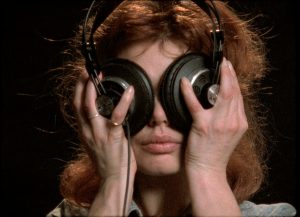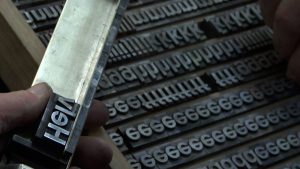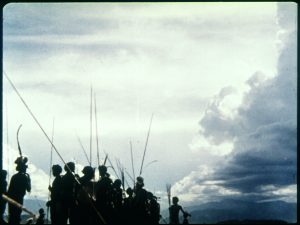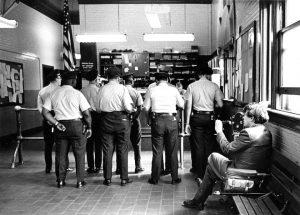THE OWL’S LEGACY
Chris Marker (France 1989) 52 min. French; German; English with English subtitles.
Directed by enigmatic and brilliant essayist Chris Marker, The Owl’s Legacy is an intellectually agile, engaging and sometimes biting look at ancient Greece, its influences on Western culture and how many eras have reinterpreted the Greek legacy to reflect their own needs. After screening on European television, the series was unavailable for decades (the funder, the Onassis Foundation, took offense at comments about modern Greece). Now it has been restored and is finally being released worldwide. Each of the 13 episodes is centered on a potent Greek word. We will screen episodes 1 Symposium—or accepted ideas and 4 Nostalgia—or the impossible return. Playing with The Pharaoh’s Belt, animator Lewis Klahr’s epic journey through a midcentury suburban boy’s imagination (1993, 43 min.).
HELVETICA
Gary Hustwit (U.S. 2007) 80 min.
Helvetica’s focus on the proliferation of one typeface (the most commonly used in the history of the printed word) instigates a larger conversation about the way type affects our lives, encompassing the worlds of design, advertising, psychology and communication.
PLAYING WITH
ZORNS LEMMA
Hollis Frampton (U.S. 1970) 60 min. 16mm.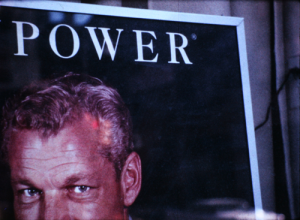
One of the most beloved and astounding films by the American avant-garde’s most erudite and playful practitioners. “Frampton’s film is an exercise in mathematical logic in cinema. Or is it a mechanical logic?… It’s about alphabet. It’s about the unities of similarities. It’s about sameness in a confusion. It’s about logic in chance. It’s about structure and logic. It’s about rhythm. Ah, what a difference between Zorns Lemma and all the ‘serious’ commercial movies that I occasionally praise!” (Jonas Mekas, Village Voice).
TOP OF PAGE
Friday, February 1 at 2pm
LOUISIANA STORY
Robert Flaherty (U.S. 1948) 77 min. 35MM.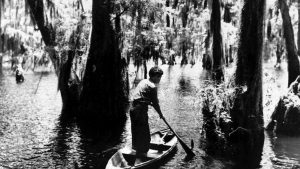
Robert Flaherty, one of documentary’s progenitors, worked in a decidedly different fashion from popular conceptions of the form, filming staged scenarios with his subjects that were generally typical of their milieu. Louisiana Story, his final film – commissioned by Standard Oil – is a kind of bucolic idyll that follows a young Cajun boy and his pet raccoon as they float along a bayou threatened by the creeping menace of alligators (Adapted from Film Society of Lincoln Center program notes). Playing with two Leslie Thornton works (Courtesy of Electronic Arts Intermix, New York): Binocular Menagerie (2014, 3 min.), a profound meditation on the minutiae of perception; and Chimp for Normal Short (1999, 7 min.), in which a chimpanzee’s pratfalls come to stand in for the human experience of media. 35mm restored print courtesy of the UCLA Film & Television Archive; preservation funded by The Film Foundation, AFI Challenge Grant for Film Preservation, American Movie Classics, and the Academy Foundation
DEAD BIRDS
Robert Gardner (U.S. 1963) 83 min. 35MM.
Esteemed filmmaker Robert Gardner’s landmark film – for both the fields of documentary and ethnographic cinema – is “a time capsule, about a society on the edge, both in terms of the marginalization of its population and the material changes that will come with the shrinking world” (Manohla Dargis, New York Times). It is about the Dani, a people dwelling high in the mountains of West Papua. When Gardner shot the film in 1961, the Dani had a classic Neolithic culture, exceptional in the way they dedicated themselves to an elaborate system of ritual warfare. Gardner described Dead Birds as “an attempt to film a people from within and to see… if they could speak not only about the Dani but also about ourselves.” Playing with two films by the hugely influential independent filmmaker Maya Deren: Ritual in Transfigured Time (U.S. 1946, 15 min. 16MM) and Meditation on Violence (U.S. 1949, 13 min. 16MM).
Friday, February 15 at 2pm
RUSH TO JUDGMENT
Emile de Antonio (U.S. 1967) 98 min.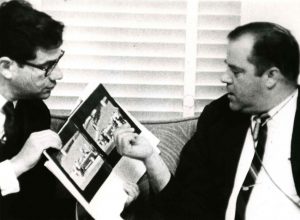
An early and perhaps never exceeded entry in the field of Warren Report-skepticist works, Rush to Judgment, made in collaboration with attorney Mark Lane, reopens the case of JFK’s assassination in a manner both methodic and wholly absent of overreaching conspiratorial speculation. Documentary as inquest, beneath its cool surface a film burning with a fervent desire for questions to be answered and justice to be done (Metrograph program notes).
PLAYING WITH
SINCE
Andy Warhol (U.S. 1966) 67 min. With Gerard Malanga, Mary Woronov. 16MM.
Pop artist Andy Warhol’s 2D work reveals his fascination with celebrities like Jackie Kennedy Onassis and with death and disaster. Fittingly, one of his many films takes the assassination of JFK as its subject, irreverently re-creating the tragedy wherein Gerard Malanga shoots Mary Woronov with a banana. “It didn’t bother me that much that he was dead,” Warhol said. “What bothered me was the way the television and radio were programming everybody to feel so sad. It seemed like no matter how hard you tried, you couldn’t get away from the thing.”
EYES – Preservation Print
Stan Brakhage (U.S. 1971) 35 min. 16MM.
Among the eminent Stan Brakhage’s 350-plus film oeuvre can be found a trilogy made in Pittsburgh, each part representing his radical approach to the concept of a cinematic document (as opposed to documentary) rooted in subjective observation. “After wishing for years to be given-the-opportunity of filming some of the more ‘mystical’ occupations of our Times – some of the more obscure Public Figures which the average imagination turns into ‘bogeyman’ … viz: Policemen, Doctors, Soldiers, Politicians, etc.: – I was at last permitted to ride in a Pittsburgh police car, camera in hand, the final several days of September 1970” (Stan Brakhage). Print courtesy of The Academy Film Archive and Film Foundation.
PLAYING WITH
LAW & ORDER
Frederick Wiseman (U.S. 1969) 81 min. 16MM.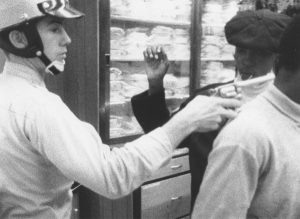
Surveying the wide range of work the police are asked to perform, Law & Order illustrates how training, community expectations, socioeconomic status of the subject, the threat of violence and discretion affect police behavior. To his own surprise, Wiseman found he’d created a sympathetic movie about cops
TOP OF PAGE
Friday, March 1 at 2pm
URBAN SHORTS PROGRAM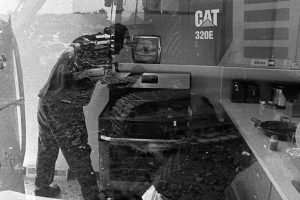
This shorts program looks at city symphonies and urban documents from across time and around the world, making stops in the Soviet Union for one of Dziga Vertov’s most spectacular “film-truths,” and Ohio, where contemporary filmmaker Kevin Jerome Everson focuses many of his films. Program: New York Street Trolleys (Ken Jacobs, U.S. 1999, 11 min.); The Eleventh Year (Dziga Vertov, U.S.S.R. 1928, 52 min.); Skyscraper (Shirley Clarke & Willard Van Dyke, U.S. 1960, 21 min. DCP); One Way Boogie Woogie (James Benning, U.S. 1977, 60 min. 16MM); Sound That + Mansfield Product Company (Kevin Jerome Everson, U.S. 2014, TRT 14 min.).
Friday, March 8 at 2pm
L’AGE D’OR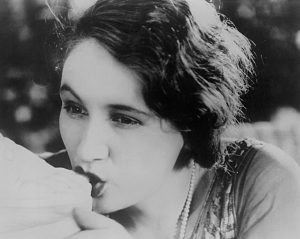
Directed by Luis Buñuel (France 1930) 63 min. 35MM. With Gaston Modot, Lya Lys, Max Ernst.
Poetic, absurd, erotic, visionary and scandalous, L’Age d’or has inspired generations of filmmakers from Hitchcock to Monty Python. Buñuel’s obsessive cinematic imagination and the surrealism of Salvador Dalí created this withering attack on a society that elevates pious morality over sexual freedom. Playing with Land Without Bread (Buñuel, France 1937, 27 min.), a shockingly subversive documentary that is ethnographic and surrealist at once. Its subject is the too-real document of its suffering subjects, a disease-ridden community living in a remote region of Spain. Its style is mocking of both the documentary form and us, the viewer.
Friday, March 22 at 2pm
PRESENTS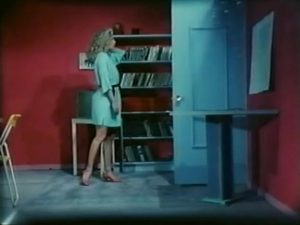
Michael Snow (U.S. 1981) 99 min. 16MM.
Sporting a runtime of a conventional feature and, as Canadian multimedia artist Michael Snow notes, the “popular subjects” of sex and violence, Presents is nevertheless surpassingly complex, and its humorous provocation begins with its punning title. It was for a time banned by the Ontario censor board… Playing with Harun Farocki’s An Image (Germany 1983, 25 min.). A political filmmaker influenced by Situationism, the Nouvelle Vague and Direct Cinema, Farocki was also prodigiously prolific. About this 1983 film, which was part of a series, Farocki said, “The television station that commissioned [it] assumes that I’m making a film that is critical of its subject matter [Playboy Magazine, in this case], and the owner or manager of the thing that’s being filmed assumes that my film is an advertisement for them. I try to do neither. Nor do I want to do something in between, but beyond both.”
Friday, March 29 at 2pm
FILM ABOUT A WOMAN WHO…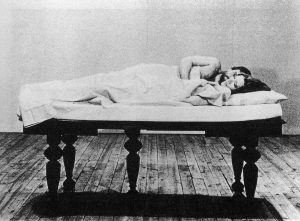
Yvonne Rainer (U.S. 1974) 105 min.
Dancer, choreographer and filmmaker, Yvonne Rainer has been a major force in the minimalist and avant-garde scene of New York (and beyond) since the sixties. Her landmark film is a meditation on ambivalence that plays with cliché and the conventions of soap opera while telling the story of a woman whose sexual dissatisfaction masks an enormous anger. Playing with Cut Piece (Albert & David Maysles, U.S. 1966, 8 min.), the Maysles brothers’ documentation of Yoko Ono’s infamous conceptual performance; and the classic feminist short Joyce at 34 (Joyce Chopra, U.S. 1972, 28 min.). Joyce at 34courtesy of the Reserve Film and Video Collection of The New York Public Library for the Performing Arts, preserved with funding from the National Film Preservation Foundation.
CHILDREN & MOTHERS PROGRAM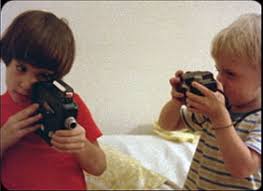
This program looks at family and childhood through the eyes of some of documentary and experimental film’s most famous and poetic practitioners. Program: Happy Mother’s Day (Joyce Chopra and Ricky Leacock, U.S. 1963, 26 min.); Mother’s Day (James Broughton, U.S. 1948, 22 min. 16MM); Scenes from Childhood (Alfred Guzzetti, U.S. 1980, 78 min.); and the second part of the prodigious Stan Brakhage’s Scenes From Under Childhood (Stan Brakhage, U.S. 1969, 40 min. 16MM), an attempt to visualize the psychological interior of a child and a keenly observed, poetic and personal documentation of his domestic family life in rural Colorado.
“Watching and listening to Guzzetti’s children [in Scenes from Childhood], one is struck with an acute sense of the import and importance of the child’s world. It’s a world that oscillates at a moment’s notice between solemnity and profundity and wildly comic humor. It can be vague or precise. A child promises to return a toy in ‘43 minutes.’ The eating and pronunciation of ‘spaghetti’ are equally taxing problems. Perhaps the best reason to see the film is as a reminder that the child’s world is only a brilliant preview of the adult world to come.” — Bruce McCabe, The Boston Globe
Friday, April 12 at 2pm
REMINISCENCES OF A JOURNEY TO LITHUANIA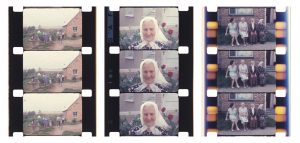
Jonas Mekas (U.S. 1972) 78 min. 16MM.
The world recently lost Jonas Mekas, whose incredible 96-year life was, among other things, a gift to independent cinema. One of the founders of the Filmmakers Cooperative, Film Culture magazine and Anthology Film Archives, he was also the author of the highly influential “Movie Journal” column in The Village Voice (1958-1975). And he was a pioneer in the genres of the diary and essay film, a spectacularly fertile and inspirational filmmaker who made films and videos into his nineties. Reminiscences of a Journey to Lithuania chronicles, through highly personal footage and voiceover, Mekas and his brother Adolfas’ first years in 1950s America; their visit to their native Lithuanian village in 1971, after a 27-year absence; the forced labor camps where they spent a year during the war; and their time in Vienna with friends and fellow avant-garde giants including Peter Kubelka, Ken Jacobs and Annette Michelson. Playing with Refuge England (Robert Vas, UK 1959, 26 min.); The Vanishing Street (Robert Vas, UK 1962, 19 min.); and Untitled: Part One, 1981 (Ernie Gehr, U.S. 1981, 29 min. 16MM).
Friday, April 19 at 2pm
MUSIC PROGRAM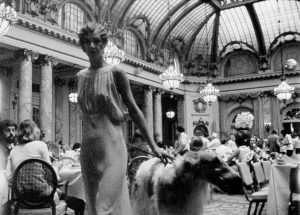
This program mixes lesser known works by cinema greats Chris Marker and Chantal Akerman with a notable documentary about Igor Stravinsky and one of the most thrilling montage masterpieces by Warren Sonbert, a master of the form. The Owl’s Legacy 8 – “MUSIC — or inner space” (Chris Marker, France 1990, 26 min. DCP); Les trois dernières sonates de Franz Schubert (Chantal Akerman, Belgium 1989, 49 min.); Stravinsky (1965, Roman Kroiter & Wolf Koenig, Canada 1965, 49 min. DCP); Friendly Witness (Warren Sonbert, U.S. 1989 32 min. 16MM).
Friday, April 26 at 2pm
FOUR SHADOWS – Elective Affinities Part 3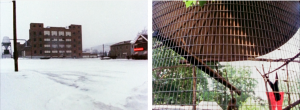
Larry Gottheim (U.S. 1978) 64 min.
Where do Wordsworth, Cézanne, and Debussy meet in late 20th century landscapes? In an animal kingdom? Part of a series of films that are “edited into a structure involving formal patterning, with repetition and permutation of elements. While formal structuring seems to dominate the initial experience, these films are further developments of my interest in thought and consciousness in cinema, and include elements of autobiography and a particularly cinematic way of exploring issues such as family, psychology, education, freedom, the theme of ‘nature’ in art.” (LG) Playing with a chapter in the inimitable Chris Marker’s series The Owl’s Legacy: “MATHEMATICS — or The Empire Counts Back” (Chris Marker, France 1990, 26 min. DCP).
